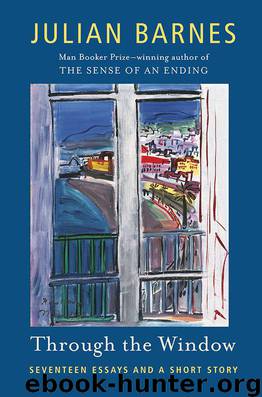Through the Window by Julian Barnes

Author:Julian Barnes [Barnes, Julian]
Language: eng
Format: epub
Tags: cookie429, Kat, Extratorrents
ISBN: 9780099578581
Publisher: Vintage
Published: 2012-01-01T00:00:00+00:00
THE MAN WHO SAVED OLD FRANCE
IFIRST STARTED GOING to France almost fifty years ago, on motoring holidays with my parents and brother. The towns and villages we then visited – quaintly, they were still filled with nothing but French people – had a solid, unchanging feel to them and a recognisable morphology: from smart mairie and PTT to dilapidated lavoir and rank pissoir, from war memorial listing unforgotten dead to blank walls pasted with the huge words ‘DEFENSE D’AFFICHER – LOI DU 29 JUILLET 1881’ (a proclamation far more strident than the flyers it was designed to deter). Behind this ordinary, diurnal France, giving it wider and deeper meaning, was the monumental France to which my schoolteacher parents introduced me (at times, inflicted upon me): the chateaux and cathedrals, museums and public buildings, artworks and ruins – a France of history, power and money, a France of official, national beauty. There seemed an extraordinary amount of it around, its symbols leaping out from every fold of the yellow Michelin road map. A back-seat navigator, I would prepare my parents for what lay round the next bend. A solid black oblong denoted a chateau worth slowing down for; a similar oblong with legs at each corner one worth a stop; a triangle of black dots meant a ruined castle; while a curious mark, like a wonky version of the pi symbol, indicated some prehistoric vestige. All this seemed just as solid and eternal as the daily life, if not more so.
When we toured the chateaux of the Loire, I couldn’t help noticing that many of these great palaces seemed remarkably empty of furniture, and was given to understand that it had all disappeared in the Revolution. Into my mind came vague images – perhaps culled from the film of A Tale of Two Cities – of looting sans-culottes with wild eyes and bad shaves. The green Michelin guidebooks to which we referred for our facts were, I now realise, written and edited by a team diplomatically keen not to offend any strand of French opinion; so there was much elision, and a tactical unwillingness to take any controversial (or even discernible) side in France’s long internecine history. Nor did the books indicate how precarious had been the earlier life of this solid monumentality we dutifully visited. Still less did they mention, let alone salute, the man without whose decisive influence and actions what the French now call their patrimony would have been considerably diminished: Prosper Mérimée.
On this side of the Channel, Mérimée (1803–70) is mainly remembered as the author of the novella from which Carmen was drawn; though Bizet’s opera, in the words of Mérimée’s best British biographer, Alan Raitt, is ‘no more than an emasculated and prettified version of Mérimée’s tale’. He wrote fiction – specialising in themes of cruelty, revenge and the Implacable Woman – plays and poetry. He was a serious Anglophile, who once proposed marriage to Mary Shelley, and was so well known at the British Museum
Download
This site does not store any files on its server. We only index and link to content provided by other sites. Please contact the content providers to delete copyright contents if any and email us, we'll remove relevant links or contents immediately.
| Booksellers & Bookselling | General |
| History of Books |
4 3 2 1: A Novel by Paul Auster(12356)
The handmaid's tale by Margaret Atwood(7732)
Giovanni's Room by James Baldwin(7305)
Asking the Right Questions: A Guide to Critical Thinking by M. Neil Browne & Stuart M. Keeley(5742)
Big Magic: Creative Living Beyond Fear by Elizabeth Gilbert(5729)
Ego Is the Enemy by Ryan Holiday(5395)
The Body: A Guide for Occupants by Bill Bryson(5066)
On Writing A Memoir of the Craft by Stephen King(4921)
Ken Follett - World without end by Ken Follett(4708)
Adulting by Kelly Williams Brown(4554)
Bluets by Maggie Nelson(4535)
Eat That Frog! by Brian Tracy(4502)
Guilty Pleasures by Laurell K Hamilton(4428)
The Poetry of Pablo Neruda by Pablo Neruda(4082)
Alive: The Story of the Andes Survivors by Piers Paul Read(4011)
White Noise - A Novel by Don DeLillo(3992)
Fingerprints of the Gods by Graham Hancock(3980)
The Book of Joy by Dalai Lama(3962)
The Bookshop by Penelope Fitzgerald(3829)
